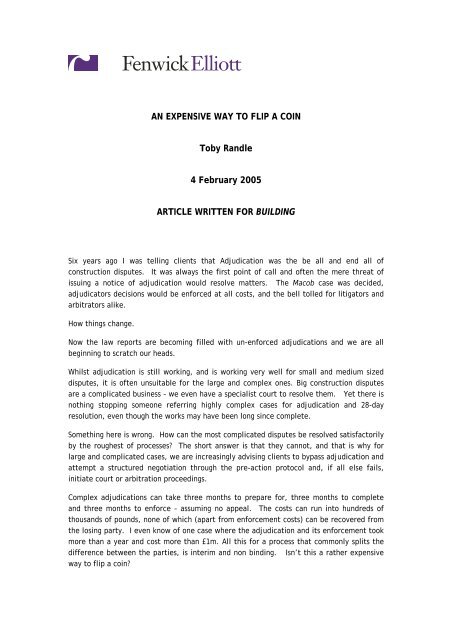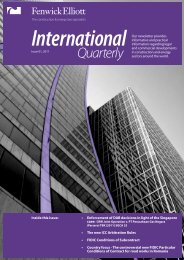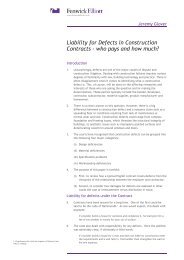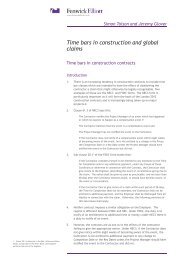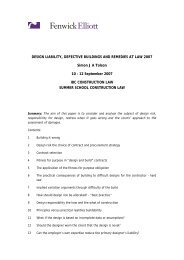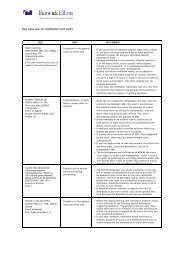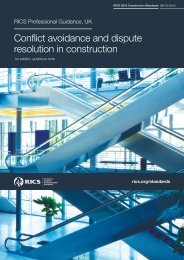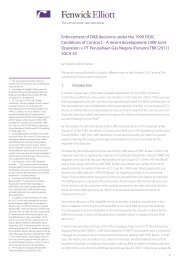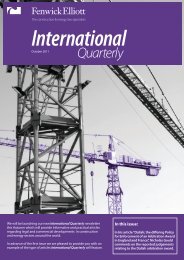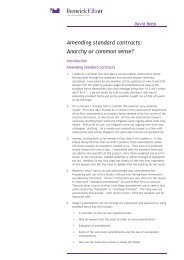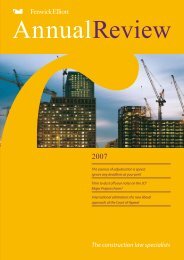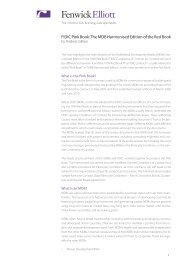Download the PDF - Fenwick Elliott
Download the PDF - Fenwick Elliott
Download the PDF - Fenwick Elliott
Create successful ePaper yourself
Turn your PDF publications into a flip-book with our unique Google optimized e-Paper software.
AN EXPENSIVE WAY TO FLIP A COIN<br />
Toby Randle<br />
4 February 2005<br />
ARTICLE WRITTEN FOR BUILDING<br />
Six years ago I was telling clients that Adjudication was <strong>the</strong> be all and end all of<br />
construction disputes. It was always <strong>the</strong> first point of call and often <strong>the</strong> mere threat of<br />
issuing a notice of adjudication would resolve matters. The Macob case was decided,<br />
adjudicators decisions would be enforced at all costs, and <strong>the</strong> bell tolled for litigators and<br />
arbitrators alike.<br />
How things change.<br />
Now <strong>the</strong> law reports are becoming filled with un-enforced adjudications and we are all<br />
beginning to scratch our heads.<br />
Whilst adjudication is still working, and is working very well for small and medium sized<br />
disputes, it is often unsuitable for <strong>the</strong> large and complex ones. Big construction disputes<br />
are a complicated business – we even have a specialist court to resolve <strong>the</strong>m. Yet <strong>the</strong>re is<br />
nothing stopping someone referring highly complex cases for adjudication and 28-day<br />
resolution, even though <strong>the</strong> works may have been long since complete.<br />
Something here is wrong. How can <strong>the</strong> most complicated disputes be resolved satisfactorily<br />
by <strong>the</strong> roughest of processes The short answer is that <strong>the</strong>y cannot, and that is why for<br />
large and complicated cases, we are increasingly advising clients to bypass adjudication and<br />
attempt a structured negotiation through <strong>the</strong> pre-action protocol and, if all else fails,<br />
initiate court or arbitration proceedings.<br />
Complex adjudications can take three months to prepare for, three months to complete<br />
and three months to enforce – assuming no appeal. The costs can run into hundreds of<br />
thousands of pounds, none of which (apart from enforcement costs) can be recovered from<br />
<strong>the</strong> losing party. I even know of one case where <strong>the</strong> adjudication and its enforcement took<br />
more than a year and cost more than £1m. All this for a process that commonly splits <strong>the</strong><br />
difference between <strong>the</strong> parties, is interim and non binding. Isn’t this a ra<strong>the</strong>r expensive<br />
way to flip a coin
Adjudication was always intended to be a “pay now, argue later” system. What we are<br />
starting to see is an “argue now, argue later” process. Why not cut out <strong>the</strong> middleman, go<br />
straight to court or arbitration and get a better, binding decision. Granted it may take a<br />
little longer and may be more expensive, but <strong>the</strong> chances are you will be in court anyway in<br />
<strong>the</strong> end, so <strong>the</strong> sooner you get started <strong>the</strong> better. At least if you win you should get most<br />
of your costs back.<br />
Also, <strong>the</strong> courts can force <strong>the</strong> parties to talk to each o<strong>the</strong>r, to mediate where possible and<br />
to adopt a sensible and pragmatic approach to <strong>the</strong> resolution of a dispute within a<br />
reasonable timescale. Paradoxically, your best chance of getting a deal may <strong>the</strong>refore be<br />
to initiate court proceedings, via <strong>the</strong> pre-action protocol and mediation, than by going<br />
straight to adjudication.<br />
On <strong>the</strong> o<strong>the</strong>r hand, adjudication forces <strong>the</strong> polarisation of <strong>the</strong> parties’ positions at <strong>the</strong><br />
earliest of stages. There is no time for negotiation during <strong>the</strong> process, and afterwards <strong>the</strong><br />
parties are so fed up with each o<strong>the</strong>r that <strong>the</strong>re is little chance <strong>the</strong>n ei<strong>the</strong>r. Also,<br />
adjudicators are scared to death of being perceived to be unfair to a party and being<br />
criticised by a judge for breaching natural justice. They <strong>the</strong>refore tend to bend over<br />
backwards to accommodate all sorts of requests and applications by a party. This means<br />
that tactical procedural wrangling is common – something that would not be tolerated in<br />
court.<br />
It is only a matter of time before <strong>the</strong> courts refuse to enforce an adjudicator’s decision<br />
because <strong>the</strong> dispute was too big or complicated for a fair decision to be made in <strong>the</strong><br />
timescale. There has already been one attempt, in CIB Properties Limited –v- Birse<br />
Construction Limited, where a £12 million dispute was referred to adjudication – <strong>the</strong><br />
reference included 49 files and sixteen witness statements. In that case, <strong>the</strong> adjudication<br />
timetable was extended to fifteen weeks and <strong>the</strong> court found <strong>the</strong>re was sufficient time to<br />
reach a fair decision. I cannot imagine it will take too long for a party on <strong>the</strong> wrong end of<br />
a similar notice to refuse to extend <strong>the</strong> timetable. It is difficult to see how a fair decision<br />
could be made on very complicated matters within six weeks.<br />
4 February 2005<br />
Toby Randle<br />
<strong>Fenwick</strong> <strong>Elliott</strong> LLP<br />
2<br />
Toby Randle – <strong>Fenwick</strong> <strong>Elliott</strong> LLP


